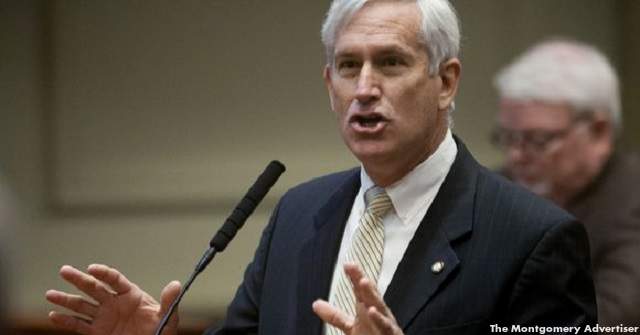CULLMAN – Sen. Paul Bussman, R-Cullman this week took to his Facebook page to explain the amendments that Alabama voters will see on the Nov. 8 ballot. (Click here to see a sample ballot for Cullman County.) We have printed his entire post below, with no edits.
(Editor's Note: The text below has not been edited for content or grammar/style; however, bold font has been added to note different amendments.)
I am getting several questions regarding the amendments on the ballot in November. Here is a summary with a good, clear explanation of each. Hope this is helpful!
Amendment Ballot Language Summary
#1 “Proposing an amendment to the Constitution of Alabama of 1901, to establish procedures to ensure that no more than three of the members of the Auburn University Board of Trustees shall have terms that expire in the same calendar year and to add two additional at—large members to the board to enhance diversity on the board.”
Amendment 1 does two things. First, it sets up a process to make sure that no more than three of the members of the Auburn University Board of Trustees will have terms that end in the same year. Second, it adds two more at-large members to the board who are intended to add diversity to the Board. This increases the Board from 14 to 16 total members with 5 at-large members. There is no cost for Amendment 1.
If the majority of the voters vote “Yes” on Amendment 1, no more than three of the members of the Auburn University Board of Trustees will have terms that end in the same year and two more at-large members will be added to the board.
If the majority of voters vote “No” on Amendment 1, the Auburn University Board of Trustees will not be able to limit the number of board member terms expiring in the same year and two more at-large members will not be added to the board.
#2 “Proposing an amendment to the Constitution of Alabama of 1901, to prohibit any monies from the State Parks Fund, the Parks Revolving Fund, or any fund receiving revenues currently deposited in the State Parks Fund or the Parks Revolving Fund, and any monies currently designated pursuant to statute for the use of the state parks system from being transferred for another purpose other than the support, upkeep, and maintenance of the state parks system.”
“Notwithstanding, in the event that guest revenues to the State Parks Revolving Fund exceed the threshold of $50 million (as annually adjusted based on increases in the consumer price index) in a fiscal year, the sales and use and cigarette tax revenue distributed to benefit the
State Parks System shall be reduced in the following fiscal year. The amount of the reduction shall correspond to the amount of guest revenue to the State Parks Revolving Fund exceeding the threshold. The amount of tax revenue not distributed to benefit the State Parks System shall be distributed to the General Fund.” “Proposing an amendment to Amendment 617 of the Constitution of Alabama of 1901, to allow the Department of Conservation and Natural Resources the option to provide for the operation and management, by non-state entities, of hotels, golf courses, and restaurants at any applicable state parks in Alabama.”
Under current law, some revenues generated at state parks may be spent by the Legislature for purposes other than maintaining the state parks. Additionally, with some exceptions, current law requires the Department of Conservation and Natural Resources to operate and maintain all state park lands and facilities. Amendment 2 would prevent the Legislature from spending revenues generated at state parks for purposes other than maintaining the state parks unless these revenues exceeded $50 million annually. Amendment 2 would also allow, but not require, certain state park lands and facilities to be operated and maintained by an entity other than the Department of Conservation and Natural Resources. There is no cost for Amendment 2.
If a majority of voters vote “Yes” on Amendment 2, revenues generated at state parks would be much more likely to be used for maintaining state parks, and an entity other than the Department of Conservation and Natural Resources could be allowed to operate and maintain certain state park lands and facilities.
If a majority of voters vote “No” on Amendment 2, the Legislature would continue to be able to spend revenues generated at state parks for purposes other than maintaining state park lands and facilities, and all state park lands and facilities would remain exclusively operated by the Department of Conservation and Natural Resources.
#3 “Proposing an amendment to the Constitution of Alabama of 1901, to revise the procedure for adoption of local constitutional amendments to provide that a proposed constitutional amendment the Legislature determines without a dissenting vote applies to only one county or a political subdivision within one or more counties shall be adopted as a valid part of the constitution by a favorable vote of a majority of the qualified electors of the affected county or the political subdivision and county or counties in which the political subdivision is located, who vote on the amendment.”
Amendment 3 would replace the existing method for deciding whether a proposed constitutional amendment should be voted on a) by the voters of the affected local community only, or b) by the voters of the entire state. Currently, that decision is made by the Local Constitutional Amendment Commission, which is composed of the Governor, Lieutenant Governor, Speaker of the House of Representatives, Attorney General, and Secretary of State. For your information, a proposed constitutional amendment first must be passed by a three-fifths vote of each house of the Legislature. The amendment must then be ratified by a vote of the people on an election ballot. All constitutional amendments must be decided by the voters of the entire state unless a) the proposed amendment affects only a single county or city, and b) there was no dissenting vote in either house of the Legislature. In that case, the vote on the amendment will be limited to only the voters of the affected area, and only those voters will have the amendment on their election ballot. After the Legislature passes a proposed amendment, the Local Constitutional Amendment Commission makes the final decision on whether that amendment is eligible for a local vote. If the Commission rules that the amendment is not eligible for a local vote, it will be placed on the ballot statewide. There is no cost for Amendment 3.
If a majority of voters vote “Yes” on Amendment 3, the Local Constitutional Amendment Commission will be abolished, and the final decision on whether a proposed constitutional amendment should be voted locally or statewide will instead be made by the Legislature. After the Legislature votes to pass a proposed amendment, each house of the Legislature would then be required to pass a resolution deciding whether the proposed amendment will be voted locally or statewide. If any single legislator votes against that resolution, the proposed amendment will be placed on the ballot statewide.
If a majority of voters vote “No” on Amendment 3, the existing method of deciding whether a proposed constitutional amendment should be voted on locally or statewide will continue to operate.
#4 “Proposing an amendment to the Constitution of Alabama of 1901, to authorize each county commission in the state to establish, subject to certain limitations, certain programs related to the administration of the affairs of the county.”
The State Constitution gives local government very little legislative authority, and instead provides that authority to the legislature. So, the legislature makes decisions for counties and local governments one at a time, through “local acts.”
In 2005, the Legislature adopted The Alabama Limited Self Governance Act, which allows counties to adopt laws that address controlling weeds, junkyards, litter and rubbish, noise, pollution, unsanitary sewage and animal control without having to ask permission from the Legislature. The laws are only effective in unincorporated areas of the county and can only be enforced if approved by a majority of voters in the affected area. Since 2005, 19 counties have utilized the provisions of this law. Amendment 4 would give counties essentially the same authority granted through the Alabama Limited Self Governance Act without the need for seeking approval from a majority of voters in the affected area. Under Amendment 4, counties could pass and enforce these laws by vote of the county commission. Specifically, Amendment 4 would allow for counties to adopt programs and policies relating to county personnel, litter-free roadways and public property, public transportation, safety on public roads and emergency assistance. Amendment 4 would prevent a county from imposing a tax or fee or, establishing any program that would infringe on a citizen’s rights to the use of his or her private property. Amendment 4 would not change any of the compensation, terms of office, powers or duties of elected officials of the county. There is no cost for Amendment 4. Amendment 4 does not apply to Jefferson County and does not allow a county to supersede, repeal, or amend a local law that currently exists.
If a majority of voters vote “Yes” on Amendment 4, county commissions can adopt programs and policies relating to county personnel, litter-free roadways and public property, public transportation, safety on public roads, and emergency assistance without having to ask permission from the legislature.
If a majority of voters vote “No” on Amendment 4, the process used by counties for adopting and enforcing local laws related to controlling weeds, junkyards, litter and rubbish, noise, pollution, unsanitary sewage and animal control would remain the same.
#5 “Proposing an amendment to the Constitution of Alabama of 1901, to repeal and restate the provisions of Article III of the Constitution of Alabama of 1901 relating to separation of powers to modernize the language without making any substantive change, effective January 1, 2017.”
Language related to the powers given to the three branches of Alabama government is currently contained in two parts of the State Constitution. The first part, known as Article III, divides state government into the legislative, executive, and judicial branches, and says that one branch “shall never” exercise the powers of the other two branches. The second part, known as Amendment 582, says that the state is required to follow a state court order to spend state funds only after the spending has been approved by a majority of the Legislature.
Amendment 5 does two things. First, it combines Article III and Amendment 582 into the same part of the State Constitution. Second, it removes words and phrases that are no longer commonly used; for example, outdated phrases such as “body of magistracy” and “to wit” are deleted. Because all other changes are technical – for instance, where the current law says that one branch “shall never” exercise the powers of the other two branches, the new law would say that one branch “may not” exercise the powers of the other two branches – Amendment 5 really does nothing more than combine and restate current law. There is no cost for Amendment 5.
If a majority of voters vote “Yes” on Amendment 5, the parts of the State Constitution that deal with the separation of powers between the branches of state government will be contained in the same place and will not include outdated language.
If a majority of voters vote “No” on Amendment 5, the parts of the State Constitution that deal with the separation of powers between the branches of state government will remain separate and will still contain outdated language.
#6 “Proposing an amendment to the Constitution of Alabama of 1901, to become operative January 1, 2017, to repeal and replace Article VII, Impeachments.”
Amendment 6 changes how the Governor, Lieutenant Governor, Attorney General, State Auditor, Secretary of State, State Treasurer, State Board of Education, Commissioner of Agriculture, and the Alabama Supreme Court can be impeached and removed from office. Currently, the State Constitution does not set the number of votes required to remove one of these officials from office. Amendment 6 would require a two-thirds majority vote of the Alabama Senate for removal from office. Also, under current law, the appointed Superintendent of Education is subject to impeachment but not the elected State Board of Education. Amendment 6 adds the entire State Board of Education and removes the Superintendent of Education, who is appointed by and can only be removed by the Board, from the impeachment process. Amendment 6 will not change the reasons someone can be impeached. There is no cost for Amendment 6.
If a majority of voters vote “Yes” on Amendment 6, Alabama will modify the process to remove the Governor, Lieutenant Governor, Attorney General, State Auditor, Secretary of State, State Treasurer, State Superintendent of Education , State Board of Education, Commissioner of Agriculture, and the Alabama Supreme Court.
If a majority of voters vote “No” on Amendment 6, the process to impeach and remove certain elected officials will not be changed.
#7 “Relating to Etowah County, proposing an amendment to the Constitution of Alabama of 1901, to provide that the employees of the Office of Sheriff of Etowah County, except for the chief deputy, chief of detention, chief of administration, chief of investigation, director of communications, and food service manager, shall be under the authority of the of the Personnel Board of the Office of the Sheriff of Etowah County.”
Amendment 7 will require that all Etowah County Sheriff’s employees, except the chief deputy, chief of detention, chief of administration, chief of investigation, director of communications, and food service manager, will be under the authority of the Personnel Board of the Office of Sheriff of Etowah County. The Personnel Board of the Office of Etowah County was created during the 2015 Regular Session of the Alabama Legislature by Act No. 2015-351 but will not be officially established unless Amendment 7 is ratified. Amendment 7 will only relate to Etowah County. There is no cost for Amendment 7.
If a majority of voters locally and statewide vote “Yes” on Amendment 7, all Etowah County Sheriff’s employees, except the chief deputy, chief of detention, chief of administration, chief of investigation, director of communications, and food service manager, will be under the authority of the Personnel Board of the Office of Sheriff of Etowah County beginning June 1, 2017.
If a majority of voters either locally or statewide vote “No” on Amendment 7, no Etowah County Sheriff’s employees will be under the authority of the Personnel Board of the Office of Sheriff of Etowah County, and the board will not be officially established.
#8 “Proposing an amendment to the Constitution of Alabama of 1901, to declare that it is the public policy of Alabama that the right of persons to work may not be denied or abridged on account of membership or nonmembership in a labor union or labor organization; to prohibit an agreement to deny the right to work, or place conditions on prospective employment, on account of membership or nonmembership in a labor union or labor organization; to prohibit an employer from requiring its employees to abstain from union membership as a condition of employment; and to provide that an employer may not require a person, as a condition of employment or continuation of employment, to pay dues, fees, or other charges of any kind to any labor union or labor organization.”
Under current law, the Code of Alabama, but not the State Constitution, declares that a person’s membership or nonmembership in a labor union or organization may not eliminate or reduce that person’s right to work, nor be used as a condition for employment or continuation of employment. Amendment 8 would place these identical right-to-work provisions from the Code of Alabama in the State Constitution. There is no cost for Amendment 8.
If a majority of voters vote “Yes” on Amendment 8, both the Code of Alabama and Alabama’s Constitution would protect a person’s right to work, regardless of membership or nonmembership in a labor union or organization.
If a majority of voters vote “No” on Amendment 8, then a person’s right to work, regardless of membership or nonmembership in a labor union or organization, would remain protected in the Code of Alabama, but would not be protected in the Alabama Constitution.
#9 “Relating to Pickens County, proposing an amendment to the Constitution of Alabama of 1901, to provide that a person who is not over the age of 75 at the time of qualifying for election or at the time of his or her appointment may be elected or appointed to the office of Judge of Probate of Pickens County.”
Under current law, a person is constitutionally prohibited from being elected or appointed to a judicial office in Alabama, including Probate Judge, after reaching the age of 70 years. Amendment 9 would allow a person who is not over the age of 75 to be elected or appointed Probate Judge in Pickens County. The person’s age would be considered at either the beginning of the time to qualify for an election (if the person was elected) or at the time of the appointment (if the person was appointed). No other judicial offices in the state would be impacted by Amendment 9. The Amendment only applies to Pickens County. There is no cost for amendment 9.
If a majority of voters locally and statewide vote “Yes” on Amendment 9, a person who is not over the age of 75 years could be elected or appointed to be the Pickens County Probate Judge, but, for all other judicial offices in the state, the current statewide constitutional prohibition of electing or appointing a person who has reached the age of 70 years to a judicial office would remain in place.
If a majority of voters locally and statewide vote “No” on Amendment 9, the current statewide constitutional prohibition against electing or appointing a person who has reached the age of 70 years to a judicial office would remain in place for all judicial offices in the state.
#10 “Relating to Calhoun County, proposing an amendment to the Constitution of Alabama of 1901, to provide that any territory located in the county would be subject only to the police jurisdiction and planning jurisdiction of a municipality located wholly or partially in the county.”
Amendment 10 will prevent any city or town that is not located completely or partially within Calhoun County from exercising police jurisdiction or planning jurisdiction over any territory in Calhoun County. Amendment 10 will only relate to Calhoun County. Currently, some Alabama cities have the authority to exercise police jurisdiction within 3 miles of its corporate limits and planning jurisdiction (subdivision and certain development) within 5 miles of its corporate limits. Amendment 10 would provide that a city or town that is completely outside the county boundaries of Calhoun County cannot exercise any police or planning jurisdiction inside Calhoun County. There is no cost for Amendment 10.
If a majority of voters locally and statewide vote “Yes” on Amendment 10, only cities or towns that are located completely within or partially within Calhoun County will be able to exercise police jurisdiction or planning jurisdiction over any territory in Calhoun County.
If a majority of voters locally or statewide vote “No” on Amendment 10, current laws related to a city or town exercising police jurisdiction or planning jurisdiction will remain in place.
#11 “Proposing an amendment to the Constitution of Alabama of 1901, as amended, to permit cities and counties, notwithstanding any existing constitutional restrictions, to utilize tax increment district revenues collected within a Major 21st Century Manufacturing Zone and other moneys to incentivize the establishment and improve various types of manufacturing facilities located or to be located in such Zone, and to validate and confirm the Major 21st Century Manufacturing Zone Act, Act No. 2013-51.”
Under current law, a city or county may pledge a projected increase in future property taxes to acquire and redevelop private property located in areas that have been specially designated as suitable for certain major manufacturing facilities. After acquisition, the city or county may sell the property to a private entity, but the sale price must, at a minimum, equal the property’s fair market value. Amendment 11 would give the city or county sole discretion to determine the sale price of property meeting these conditions, regardless of the property’s fair market value. There is no cost for Amendment 11.
If a majority of voters vote “Yes” on Amendment 11, cities and counties would be allowed to sell certain city- or county-owned property for less than its fair market value if the property is located in areas of the city or county specially designated as suitable for certain major manufacturing facilities.
If a majority of voters vote “No” on Amendment 11, cities and counties would remain required to sell for at least fair market value any city or county-owned property located in areas that have been specially designated as suitable for certain major manufacturing facilities.
#12 “Relating to municipalities in Baldwin County; proposing an amendment to the Constitution of Alabama of 1901, to authorize the Legislature by general or local law to provide for any municipalities in the county to incorporate a toll road and bridge authority as a public corporation in the municipality for the construction and operation of toll roads Page 2 H3510 and bridges in the municipality and to authorize the authority to issue revenue bonds to finance the projects.”
Amendment 12 would allow the Alabama Legislature to enact a future law incorporating a toll road and bridge authority for a city or town in Baldwin County. The membership, duties, and powers of the authority would be included in the law establishing the authority. If established, the authority would be a public corporation that would oversee the construction and operation of toll roads and bridges within the limits of its city or town. Any established toll road and bridge authorities may be authorized to finance its projects and may accept funding from Baldwin County or other state or local governmental entities. Amendment 12 will only relate to the towns and cities in Baldwin County. There are no costs, at this time, for Amendment 12.
If a majority of voters locally and statewide vote “Yes” on Amendment 12, the Alabama Legislature would be authorized to enact a future local law incorporating a toll road and bridge authority for a city or town in Baldwin County.
If a majority of voters locally and statewide vote “No” on Amendment 12, the Alabama Legislature would not be authorized to establish, now or in the future, a toll road and bridge authority for a city or town in Baldwin County.
#13 “Proposing an amendment to the Constitution of Alabama of 1901, to repeal any existing age restriction on the appointment, election, or service of an appointed or elected official, with the exception of persons elected or appointed to a judicial office, currently imposed by a provision of the Constitution or other law; and to prohibit the Legislature from enacting any law imposing a maximum age limitation on the appointment, election, or service of an appointed or elected official.”
Under current law, people who have reached a certain age are not allowed to run for or be appointed to certain public offices. Amendment 13 does two things. First, except for judicial offices, Amendment 13 eliminates any law that imposes a maximum age restriction on the election or appointment of a public official. Second, Amendment 13 prevents the Legislature from passing a future law that includes a maximum age restriction on the election or appointment of a public official. There is no cost for Amendment 13.
If a majority of voters vote “Yes” on Amendment 13, any law that imposes a maximum age restriction on the election or appointment of a non-judicial public official would be eliminated, and the Legislature would be prevented from passing a future law that includes a maximum age restriction on the election or appointment of a public official.
If a majority of voters vote “No” on Amendment 13, laws that prevent people of a certain age from running for or being appointed to certain public offices would remain in place.
#14 “Proposing an amendment to the Constitution of Alabama of 1901, to amend Amendment 448 to the Constitution of Alabama of 1901, now appearing as Section 71.01 of the Official Recompilation of the Constitution of Alabama of 1901, as amended, to ratify, approve, validate, and confirm the application of any budget isolation resolution relating to a bill proposing a local law adopted by the Legislature before November 8, 2016, that conformed to the rules of either body of the Legislature at the time it was adopted.”
Amendment 448 was added to the State Constitution in 1984. The major purpose of that amendment was to encourage the Legislature to consider bills related to the state’s budgets before considering general or local bills on other subjects. To do that, the amendment required the Legislature to pass what became known as a “Budget Isolation Resolution,” or BIR, on every bill it considered before passing the state’s budgets and sending them to the Governor. Importantly, in order to pass, Amendment 448 said that a BIR needed approval from at least 60 percent of the legislators present. After Amendment 448 was added to the State Constitution, the operating rules used by the House of Representatives were changed to say that a BIR needed approval from at least 60 percent of the legislators present and voting in order to pass. On general bills impacting the entire state, all legislators who are present at the time of the vote normally cast their vote for or against the bill. But on local bills that only impact a small area of the state, such as one city or county, legislators who are present at the time of the vote normally cast their vote for or against the bill only if they represent the portion of the state impacted by the bill. Because of this “local courtesy,” the BIR for local bills passed since 1984 may have been approved by at least 60 percent of the legislators present and voting, but not necessarily by at least 60 percent of the legislators present. In other words, for these local bills, the same BIR vote that was acceptable under the House rules was inadvertently unacceptable under Amendment 448. Amendment 14 clears up this problem. Under Amendment 14, any BIR passed on a local bill between 1984 (when the BIR requirement was added to the State Constitution) and November 8, 2016 (when Amendment 14 is on the ballot) would be considered approved if the original adoption of the BIR conformed to the rules of the House or Senate in place at the time they were adopted. There is no cost for Amendment 14.
If a majority of voters vote “Yes” on Amendment 14, local laws passed by the Legislature between 1984 and November 8, 2016, will be considered approved so long as those laws were passed in accordance with legislative rules in place at the time they were adopted.
If a majority of voters vote “No” on Amendment 14, local laws passed by the Legislature between 1984 and November 8, 2016, will remain in place unless and until an appropriate state official determines otherwise.































